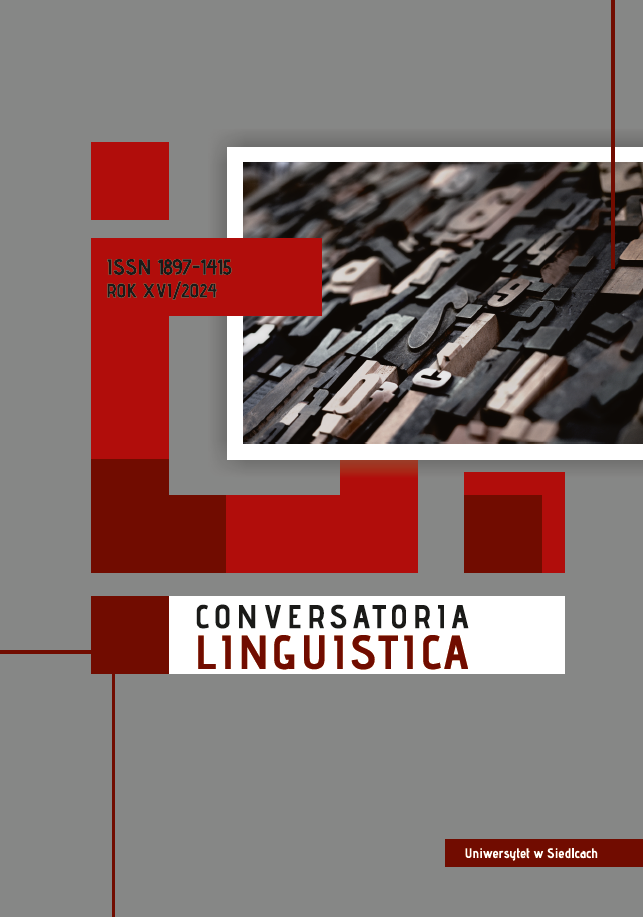The concepts of HOME and DESERT as antipodes in an axiological sense as an example from a modern novel
DOI:
https://doi.org/10.34739/clg.2024.16.05Keywords:
value, concept, home, desert, antipodeAbstract
The modern world is considered a global village. Modern people for nomads. The term nomad is even associated with certain modern professions. There is the possibility of working from home to work all over the world. In such a mixed and confused context, we attempt to define the concept HOME and the concept DESERT, as its antipode. The inspiration for such a contrast emerges to us by reading the novel Personal Identification Number by the contemporary Macedonian and European writer Lidija Dimkovska. She herself is a kind of a modern “nomad” writer (who does not have a one and only HOME in a lifetime). In order to define these concepts from an axiological point of view, we conducted a survey among of first-year students at the Faculty of Educational Sciences in Shtip. The concepts they had to define were: HOME, HOST(MAN) and DESERT. In the analysis we also take into account the semantic definitions for these concepts as suggested in the Interpretive Dictionary of the Macedonian Language.
Downloads
References
Литература
Bartmiński J. (1990): Punkt widzenia, perspektywa interpretacyjna, językowy obraz świata, w: Językowy obraz świata, red. J. Bartmiński, Lublin, s. 109–127.
Bartmiński J. (2009): Aspects of Cognitive Ethnolinguistics, Sheffield.
Bartmiński J. (2022): Folk, national, and transnational dimensions of ethnolinguistics, w: Etnolingwistyka – bilans dyscypliny Metody i postulaty badawcze, red. S. Niebrzegowska-Bartmińska, A. Głaz, Lublin, s. 13–29.
Bartmiński J., Pazio-Wlazłowska D., Żywicka B. (2022): Leksykon aksjologiczny Słowian i ich sąsiadów – stan obecny i perspektywy kontynuacji, w: Nazwy wartości i koncepty kulturowe. Hierarchie i rekonstrukcje, red. S. Niebrzegowska-Bartmińska, J. Szadura, B. Żywicka, Lublin, s. 9–17.
Bułat Silva Z. (2022): Prosto, czyli jak? Definicja kognitywna Jerzego Bartmińskiego versus eksplikacja semantyczna Anny Wierzbickiej, w: Obraz świata i człowieka w kulturze ludowej i narodowej, red. E. Białek, S. Niebrzegowska-Bartmińska, J. Szadura, Lublin, s. 27–43.
Digital’jen rječnik na makedonsk’it jazyk, http://drmj.eu/ (преземено на 26 X 2023).
Dimkovska L. (2003): Jedninstv’jen matičen broj, Skopje.
Jeffries L. (1998): Meaning in English, New York.
Konecki K. (2003–2014): Tolkov’jen rječnik na makedonsk’it jazyk, Skopje.
Lakoff G., Johnson M. (1980): Metaphors We Live By, Chicago.
Niebrzegowska-Bartmińska S. (2022): Lublin cognitive ethnolinguistics: From dialecto-logy and folklore studies to cross-cultural semantics, w: Etnolingwistyka – bilans dyscypliny. Metody i postulaty badawcze, red. S. Niebrzegowska-Bartmińska, A. Głaz, Lublin, s. 199–236.
Nikolovska V. (2024): Sovr’jemenoto tradicjonalnoto v jeden makedonsk’it, roman, https://www.facebook.com/share/p/TTh5AXSAdCWGs1oX/?mibextid=oFDknk (преземено на 30 IV 2024).
Skok P. (1973): Etimologijski rječnik hrvatskoga ili srpskoga jezika, knjiga III (poni – ż), Zagreb.
Дигитален речник на македонскиот јазик, http://drmj.eu/ (преземено на 26 X 2023).
Димковска Л. (2023): Единствен матичен број, Скопје.
Конески К. (ред.) (2003–2014): Толковен речник на македонскиот јазик, Скопје.
Николовска В. (2024): Современото и традиционалното во еден македонски, роман, https://www.facebook.com/share/p/TTh5AXSAdCWGs1oX/?mibextid=oFDknk (преземено на 30 IV 2024).
Downloads
Published
Issue
Section
License
Copyright (c) 2024 Conversatoria Linguistica

This work is licensed under a Creative Commons Attribution-NonCommercial 4.0 International License.




